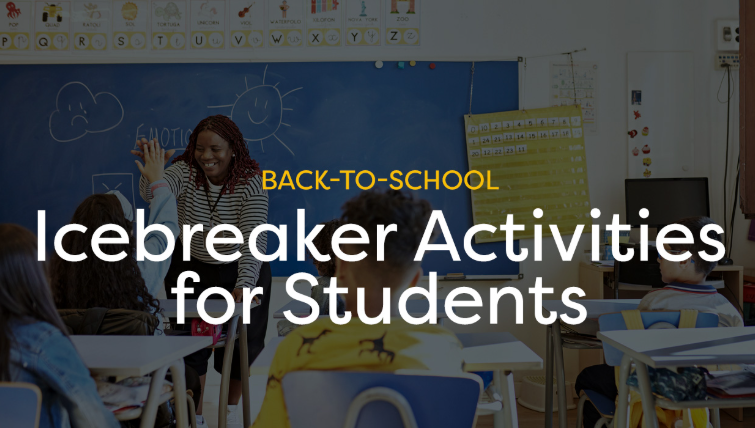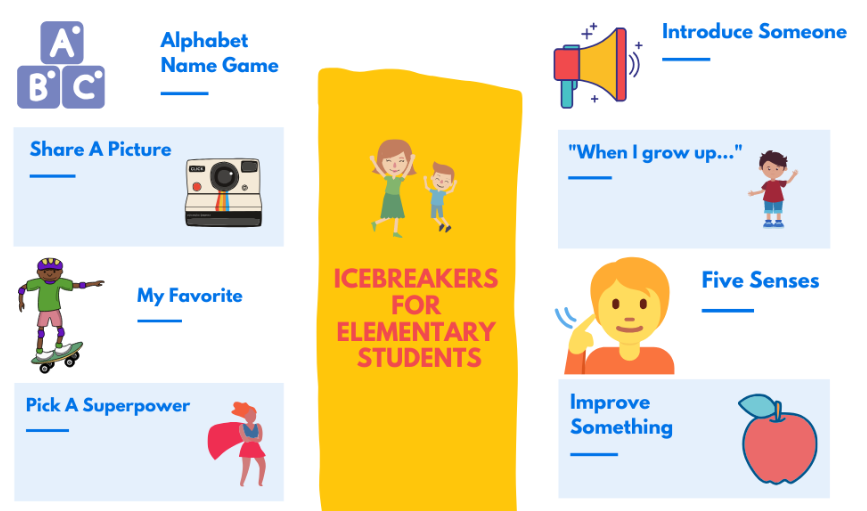Why Icebreaker Questions Are a Must-Have in the Classroom
Icebreaker questions are an essential tool for teachers, playing a crucial role in creating an engaging and supportive classroom environment. By using icebreaker questions, teachers can help students connect with one another, reduce anxiety, and foster a sense of comfort and belonging from the very first day. These icebreaker questions not only help students break the ice but also provide a valuable opportunity for teachers to learn more about their students' personalities and interests.
Creating a Supportive Learning Environment
Creating a supportive learning environment is the first step in setting students up for success. Icebreaker questions help establish a classroom atmosphere where students feel safe, comfortable, and open to learning. When students feel comfortable sharing their thoughts and experiences through icebreaker questions, they are more likely to participate in class discussions, ask questions, and take risks in their learning. This creates a classroom environment conducive to growth and collaboration, which is essential for academic success.

Icebreaker Question Examples:
- What’s your favorite thing to do during recess? This icebreaker questions allows students to talk about fun activities and interests, fostering connections early on.
- If you could have any superpower, what would it be and why? A fun and non-threatening icebreaker questions that helps students tap into their creativity and imagination.
- What’s your favorite place to visit, and what do you like about it? An icebreaker questions that encourages students to share personal experiences and bond over shared interests.
- What’s one fun fact about yourself that not many people know? This encourages students to share something unique about themselves, building deeper connections among classmates.
Fostering Student Engagement
Student engagement is crucial for long-term academic success, and icebreaker questions are an excellent way to get students involved from the start. Icebreaker questions provide an easy way for students to connect with each other, which can help them feel more comfortable and motivated to participate in class activities. By incorporating icebreaker questions, teachers can also learn about their students' interests, which allows them to tailor lessons that feel more relevant to students’ lives, further increasing engagement.
Icebreaker Question Examples:
- What’s your favorite hobby or activity? This icebreaker questions helps teachers connect students' personal interests with classroom activities.
- What’s the last book you read or movie you watched? Icebreaker questions like this one allow students to share personal favorites, fostering conversation and connection.
- What’s something that makes you feel proud of yourself? This encourages students to reflect on their achievements, boosting confidence and setting a positive tone for future class discussions.
- What’s your go-to method for relaxing after school? Icebreaker questions about self-care promote mental well-being and help students learn to manage stress.
Building Class Community
Building a strong sense of community in the classroom is essential for creating a collaborative learning environment. Icebreaker questions play a key role in this process, as they help students find common ground and build relationships with their peers. When students feel a sense of belonging, they are more likely to collaborate, support one another, and actively engage in class activities. This collaborative spirit enhances both social and academic development.
Icebreaker Question Examples:
- What’s one thing that always makes you laugh? This icebreaker questions helps students connect through humor and shared experiences.
- If you could travel anywhere in the world, where would you go? This allows students to dream big and share their aspirations, fostering empathy among classmates.
- What’s something that you think makes a good friend? Icebreaker questions like this promote positive values and help students reflect on their relationships.
- What’s something you’re most excited about this school year? This icebreaker questions encourages students to share their hopes and goals, strengthening their sense of community.
Assessing Student Interests and Learning Styles
Icebreaker questions offer teachers valuable insights into students' interests, learning preferences, and goals. By asking thoughtful icebreaker questions such as “What’s your favorite way to spend your weekend?” or “What new skill would you like to learn?” teachers can gain a better understanding of what motivates their students. This information can be used to adjust lesson plans and teaching strategies, ensuring that lessons resonate with students' individual learning styles.
Icebreaker Question Examples:
- What’s something you’re really good at or proud of? This icebreaker questions encourages students to reflect on their strengths and helps teachers understand their self-confidence.
- If you could invent something, what would it be? This encourages creativity and gives teachers insight into students' problem-solving skills.
- What’s the most interesting thing you’ve learned so far? This helps teachers gauge student curiosity and tailor lessons to their interests.
- What’s something you’d like to learn more about? This question helps teachers understand students' learning passions, allowing for more personalized lesson planning.
10 Simple Icebreakers for Elementary Students
Icebreaker questions activities are especially useful for elementary students who may be nervous or shy at the start of the school year. Here are 10 simple icebreaker ideas that can help break the ice and create a positive, welcoming classroom environment:

- Alphabet Name Game: Students introduce themselves using a fun twist, such as “Amazing Abby” or “Clever Charlie,” making name-sharing more engaging.
- Share a Picture: Students bring in a picture of something important to them, allowing them to open up and share personal stories with the class.
- My Favorite: Students share their favorite food, movie, or hobby, sparking conversation and helping classmates find common interests.
- Pick a Superpower: If students could have any superpower, what would it be? This fun icebreaker questions taps into students’ creativity.
- “Something I Like…”: Students share something they enjoy doing, like drawing, dancing, or playing a sport, fostering self-expression and confidence.
- Introduce a Partner: Students interview a classmate and introduce them to the class, helping break the ice and making introductions easier.
- What’s Your Favorite Animal and Why? A simple question that sparks curiosity and helps students connect over shared interests in animals.
- What’s One Thing You Would Change About the World? This question encourages critical thinking and allows students to share their ideas for making the world a better place.
- If You Could Live in Any Time Period, Which One Would It Be and Why? A fun question that sparks imagination and opens the door for historical discussions.
- Guess the Object: Teachers hide an object in a box, and students guess what it is, making for an interactive, low-pressure icebreaker questions.